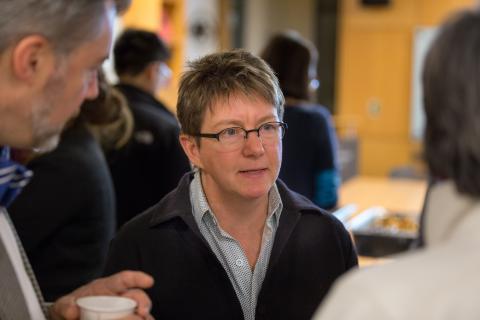Speaking With Martha Umphrey, Inaugural Director of the CHI

Eniola Ajao '21
March 20, 2020
Taking Spanish 101 in the fall was a “profound exercise in humility” for Martha Umphrey, Bertrand H. Snell 1894 Professor in American Government in the Department of Law, Jurisprudence and Social Thought. Still, she had a great time learning a new language and getting a “window into the lives of students.” Umphrey’s love of learning is evident by her varied research interests. As a professor and an active scholar of law and humanities, Umphrey’s research and teaching address privacy, speech, visual studies, performance, the cultural significance of trials, and the connection between law, love, and loss.
“Law offers a space for the negotiation of loss,” she says. She explains this theory by discussing her current research project on the trial of Matthew Shepard, a gay student at the University of Wyoming who was beaten to death in 1998. After Shepard’s death, his family established the Matthew Shepard Foundation, which helped expand federal hate crime law to include crimes motivated by disability, gender and sexual orientation. Umphrey explains, “His killing was understood to be a hate crime, a homophobic hate crime but as is often true in these cases the facts were much more complicated than that. I’m interested in trying to understand how the trial crystalized a certain story about homophobic hate crimes and changed an argument about gay panic as a defense to murder charges into an accusation of hate. I’m thinking about trials as a space for re-narrating history and reconstructing it in ways that resonate politically.”
She is finishing a book introduction on law and the visible for a book series generated out of the Department of Law, Jurisprudence and Social Thought which involves reading a lot about visual studies, visual culture and surveillance studies. Her second project emerges out of a course she teaches called “Law, Speech and the Politics of Freedom.” It’s a course she taught last year and in years past, aimed at complicating the ways we talk about free speech rights in the country. “The book, if it emerges,” she says, “will be aimed primarily at undergraduates-- a short text I hope trying to give people a toolkit for talking about speech issues that is somewhat more complicated and helpful than the one we have now.” She’s also taught a course on law and love for years, a course she developed because “a lot of legal theory thinks about law’s relation to violence: policing, police violence, crime, imprisonment, etc. But because I take seriously some of the tenets of psychoanalysis, I know that violence and attachment often go together.”
These are among her favorite courses to teach, although coming to that decision isn’t easy. Umphrey teaches a course on Law and Film that she “really loves” and another on Law’s History that she “just can’t quite get enough of.” In all her courses, Umphrey is interested in creating environments where students are able to push beyond their current understandings of subjects and engage intellectually with one another.This is similar to her vision for the CHI.
As founding director of the Center for Humanistic Inquiry (CHI), Umphrey focused on the big question of how to bring an intellectual community together when so much is going on already. She describes the experience of building up the CHI as “so much fun.” She wanted to focus on creating a space that was comfortable. She recalls the experience of picking out furniture and lamps (“We spent a lot of time on lamps!”), in order to achieve the perfect balance of warm and cool. She needed to convince people who didn't feel a humanities center was necessary that this was a valuable operation. She recalls, “I didn’t have a big budget, but I did have enough to offer food, and a space, and that’s great! It turns out that’s what people really want--and a little help with logistics.” The CHI proved to be a model for collaborative intellectual engagement. Umphrey is especially proud of the collaborations between the CHI and outside organizations. These include working with the Folger Shakespeare Library on the Folger Fellows program, working with the Emily Dickinson Museum to have a Dickinson birthday party, and working with Amherst Cinema to screen films that are related to the CHI’s theme.
As the current president of the Association for the Study of Law, Culture, and the Humanities, a group which publishes the journal Law, Culture and the Humanities, Umphrey has a lot to say about the role of the humanities in our society. She says that in order to make meaningful progress, we need to “inject the humanities into what the sciences think they are” and that uncovering what it means to be human is going to demand literacy between the divisions. Umphrey is very glad to teach at a place like Amherst, where the humanities are given generous support.
For more about Martha Umphrey and the CHI, see "Looking Back and Ahead: An Interview With Marth Umphrey" in the Amherst News.